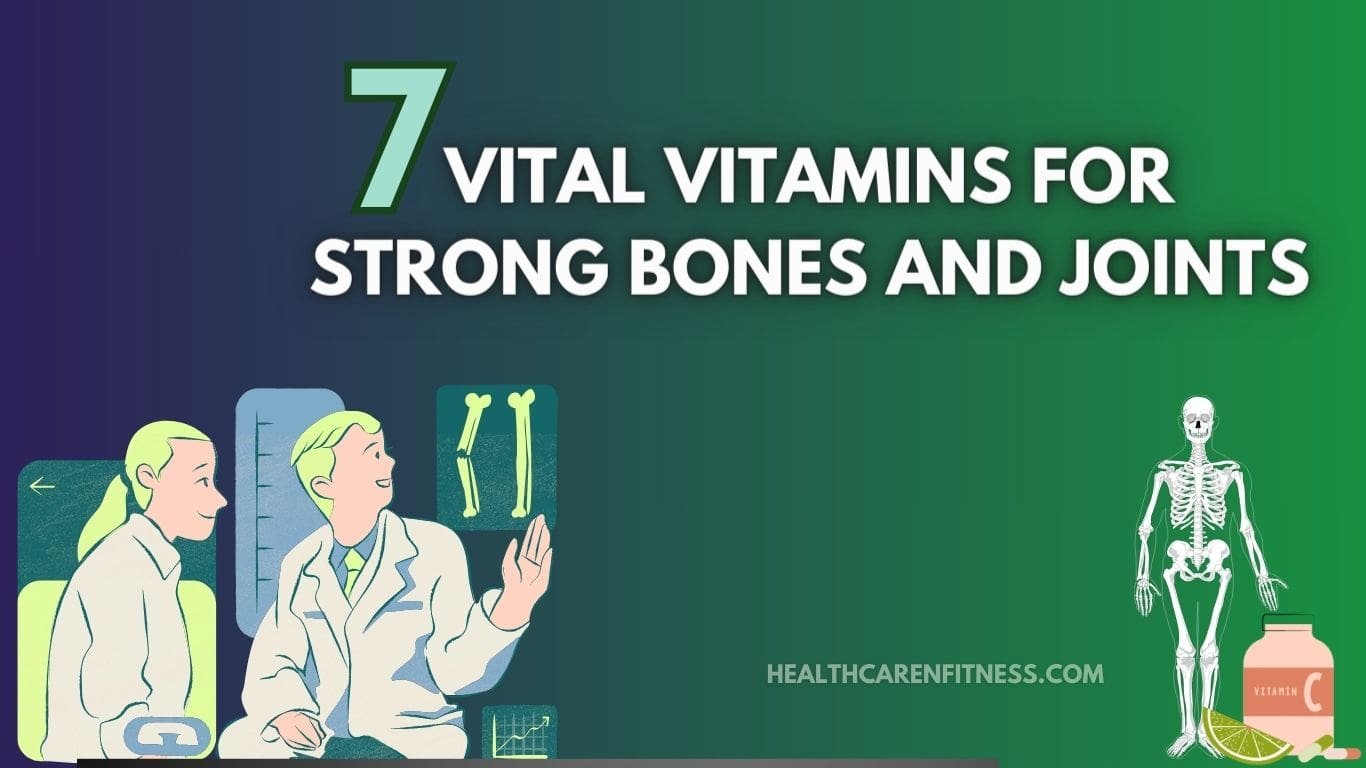
Strong, healthy bones are important for maintaining an active and fit lifestyle. Exercise. a balanced diet and rest are some important factors, however, along with these, the right vitamins are also crucial for bone and joint health. We will explore those seven essential vitamins for strong bones and joints strength.
7 Best Vitamins for Strong Bones and Joints
1. Vitamin D
Vitamin D is also called the “sunshine vitamin” because when exposed to sunlight, our body produces it. It plays an important role in the absorption of calcium, which is crucial for bone health. We can also get vitamin D from sources such as salmon, mackerel, fortified dairy products and grains.
2. Vitamin C
Vitamin C has the well-known property of strengthening the immune system, but is also important for collagen synthesis. Collagen is a protein that makes up the building blocks of bones, cartilage and ligaments. Citrus fruits, strawberries, peppers and broccoli are excellent sources of vitamin C.
3. Vitamin A
Vitamin A is vital for the development and maintenance of healthy bones and joints. It helps in the production of osteoblasts, which are cells responsible for bone formation. You can get vitamin A from food sources such as carrots, sweet potatoes, and leafy green vegetables.
4. Calcium
While not a vitamin, calcium is worth mentioning as it is a vital mineral for bone health. It provides the structural framework for bones and teeth. Dairy products such as milk, cheese and yogurt are excellent sources of calcium. Leafy green vegetables, tofu and almonds also contain calcium.
5. Vitamin B12
Vitamin B12 is crucial for maintaining healthy bones and joints as it helps in the production of red blood cells and DNA. It is mainly found in animal products such as meat, fish and dairy products. If you follow a vegetarian or vegan diet, consider taking vitamin B12 supplements.
6. Magnesium
Magnesium, the overlooked superhero nutrient, plays a starring role in over 300 biochemical reactions in the body. It helps build strong bones by working together with vitamin D. Nuts, seeds, beans and whole grains are some good source of magnesium.
7. Vitamin K
By helping to regulate calcium and promoting bone mineralization, vitamin K plays a vital role in improving bone health. Leafy greens such as kale, spinach, and chard are rich in vitamin K. It is also found in small amounts in meat, eggs, and dairy products.
Why do we need vitamins for strong bones and joints?
Vitamins play a crucial role in facilitating the absorption of calcium, which is essential for maintaining bone density and strength. Some vitamins, such as vitamin C, are necessary for the synthesis of collagen, which is a key component of bone structure and joint integrity. Vitamins such as vitamin K are involved in the regulation of bone metabolism, which helps maintain proper bone density and prevent bone loss.
Vitamins contribute to the process of bone formation and repair, ensuring that bones remain strong and resistant to damage. Some vitamins, such as vitamin E, act as antioxidants, protecting bone tissue from oxidative stress and damage caused by free radicals. Adequate vitamin intake can lead to greater bone density, reducing the risk of conditions such as osteoporosis and fractures. Vitamins also play a role in supporting joint health by maintaining the integrity of cartilage and reducing inflammation in the joints. By ensuring adequate vitamin intake, individuals can promote overall bone health, resulting in improved mobility, reduced risk of fractures, and improved quality of life. These all the reason behind the needs of vitamins for strong bones and joints.
FAQs
Can vitamins alone make my bones and joints strong?
No, vitamins alone cannot strengthen bones and joints. However, vitamins along with regular exercise, a balanced diet and adequate rest will help strengthen bones and joints.
Can I get enough vitamins from food alone?
Yes, you can get most of the vitamins you need from a well-balanced diet, however some individuals may need supplements to meet their nutritional needs.
Are there any side effects of taking vitamin supplements?
It is generally safe to take vitamin supplements if taken as directed. However, excessive intake of some vitamins can lead to negative effects. It is advisable to follow the recommended intake of supplements by a healthcare professional.
How does age affect bone and joint health?
As we age, our bones weaken and joints creak. However we can prioritizing bone and joint health through balanced meals, movements and exercises.
Conclusion
In conclusion, these essential vitamins for strong bones and joints will support your daily health and fitness. Along with these vitamins it is also important to maintain a balanced diet rich in fruits, vegetables and whole grains, engage in regular weight-bearing exercise such as walking or dancing, and prioritize quality sleep. For any personalized advice you can ask for help from a healthcare professional, who can also guide you with medical terms.
